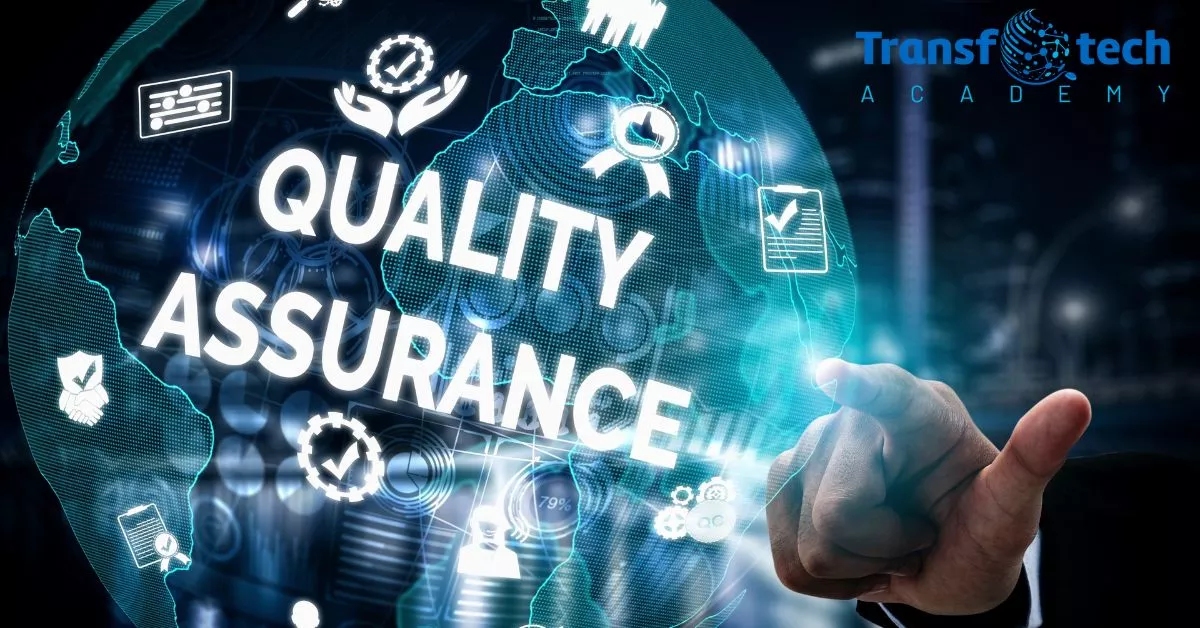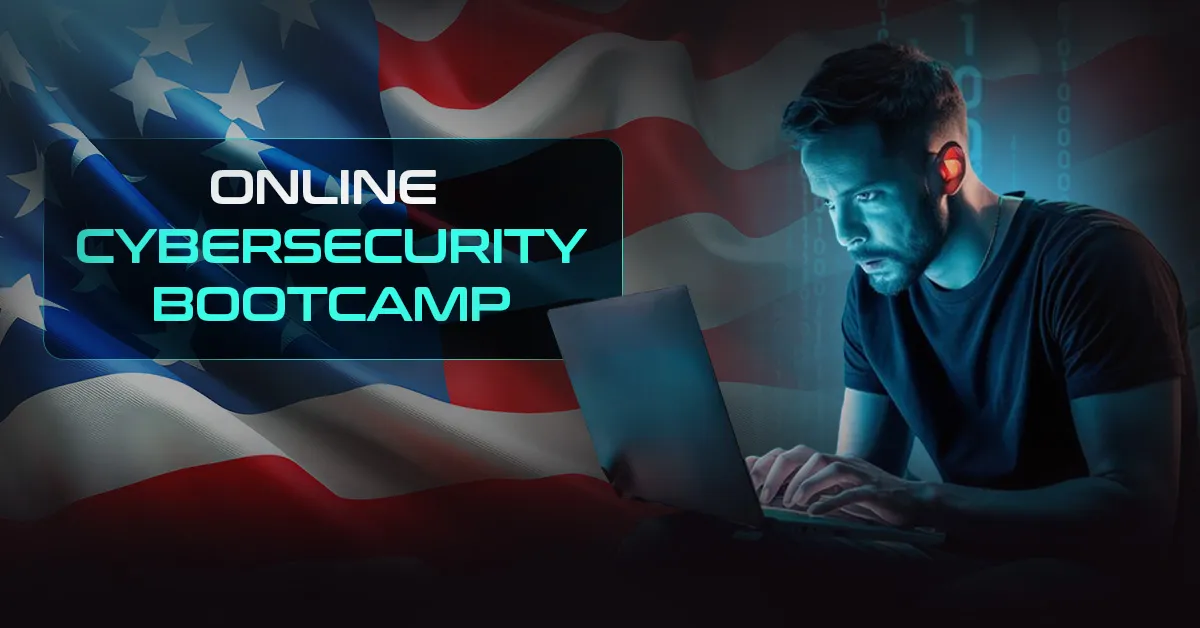What is a QA Certification in the Software Industry?
A Quality Assurance (QA) certification is a recognized credential that showcases your proficiency in software testing and your solid grasp of the software development process. It’s typically awarded by recognized industry organizations or accredited training institutions, signaling that you’ve met specific standards of knowledge and skill in QA practices.
Unlike basic course completion certificates, a QA certification carries greater credibility and recognition when it comes to landing a job. It shows employers that you’re not only familiar with testing techniques but also capable of ensuring software meets quality standards before it reaches users. This can give you a strong advantage when applying for jobs, particularly in a field that values accuracy, careful analysis, and a sharp eye for detail.
Having a QA certification can also open the door to remote job opportunities, as many companies seek certified professionals who can work independently and maintain high-quality standards from anywhere. Whether you’re starting your career or looking to advance, a QA certification adds real value to your resume.
Quality Assurance Certifications vs. Certificates: What’s the Difference?
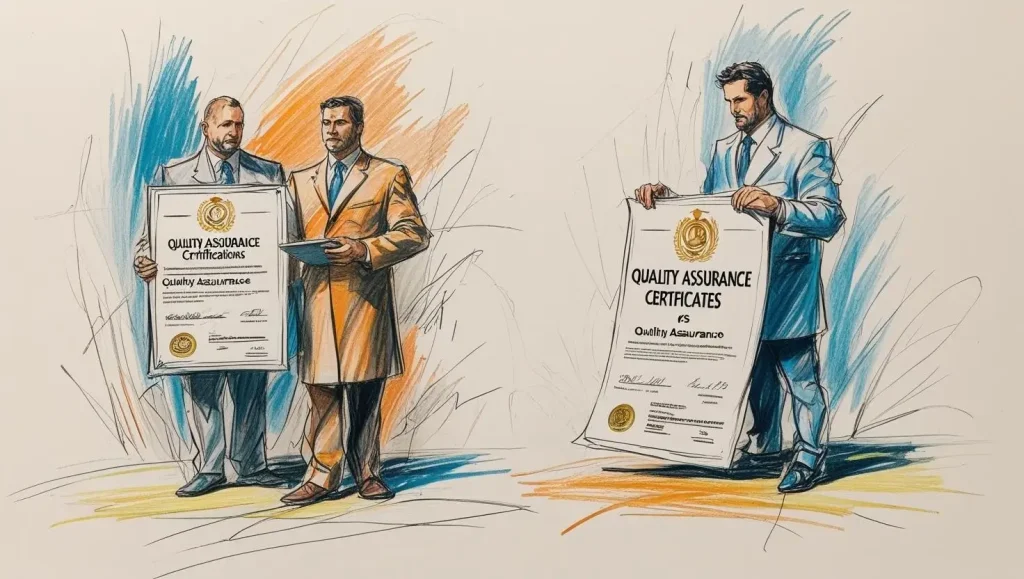
- Certification: It’s a professional award you get after passing a test from a known group. It needs updates and learning. Famous ones like ISTQB QA Certification and Certified Associate in Software Testing (CAST) are loved by employers.
- Certificate: It’s given when you finish a course. It shows you’ve learned something but might not have passed a big test.
Getting certified in software quality assurance can really make a difference in your career. It’s not just a piece of paper, it shows you’ve put in the time to learn how to properly test software, catch bugs, and make sure everything runs smoothly before it reaches users.
For many people, a QA certification helps build confidence. It tells employers you’re serious about your work and that you know what you’re doing. It can also open doors to better job opportunities, including remote positions, which is a big plus if you’re looking for flexibility.
Whether you’re just starting out or trying to move up, having that certification can give you an edge. It’s a simple step that can lead to bigger opportunities and a stronger career in tech.
Why Are QA Certifications Important in 2025?
QA engineers are in higher demand than ever before, and it’s easy to see why. As technology becomes a bigger part of our everyday live. Companies are under more pressure to deliver software that’s fast, reliable, and bug-free. No one wants to deal with crashing apps or broken websites and that’s where skilled QA professionals come in.
Having a certification in quality assurance shows employers that you’ve got the training and knowledge to make sure their products meet high standards. It goes beyond simply finding bugs — it’s about having a clear understanding of the entire software development lifecycle and ensuring every feature functions correctly before the product reaches end users.
In today’s crowded job market, a QA certification can help you stand out and show employers you’re equipped with the skills they’re looking for. It shows you’re committed to your field, serious about doing quality work, and ready to help companies deliver the best possible experience to their users.
Here’s some example why certifications are important:
Are QA Engineers in Demand?
Yes. With more complex software and agile methods, QA experts are vital. They keep the software working well. Employing a certified QA engineer plays a crucial role in delivering bug-free, high-quality software products that meet user expectations.
Remote Opportunities
Big companies like Amazon often have remote QA jobs. Certified professionals are often preferred by employers because they possess proven skills and the ability to work independently with minimal supervision.
Competitive Salaries
QA engineers at Amazon can make $80,000 to $110,000 a year. Research shows that QA professionals with certifications often earn up to 20% more than their non-certified peers. This pay difference highlights how valuable certified skills are in the eyes of employers—and how investing in your education can lead to better financial rewards. Getting certified can help you earn more and get better jobs.
Proof of Skill
Certifications prove you’re good at your job. QA certifications are especially valuable if you don’t have a formal degree in computer science or IT. They help bridge the gap by proving you have the technical skills and knowledge needed to succeed in the field—making you a strong candidate even without a traditional tech background.
Career Acceleration
Starting certifications can lead to better jobs. They can help you move up to roles like QA Lead or Manager.
Top QA Certifications for Beginners in 2025
Here are the best certifications for beginners:
1. ISTQB Foundation Level (International Software Testing Qualifications Board)
This certification is a solid choice for anyone starting out in QA, especially those looking for global recognition at an affordable price. Typically costing between $200 and $250 depending on your region, it’s a cost-effective way to gain a respected ISTQB certification. It’s ideal for beginners who want to build a strong foundation in software testing. The course covers essential topics like testing fundamentals, test management, and the use of popular testing tools, making it a smart step toward a successful QA career.
2. Certified Associate in Software Testing (CAST)
This certification stands out for its balanced approach, combining both theoretical knowledge and real-world application. Priced affordably between $100 and $150, it’s a great option for recent graduates or professionals with less than two years of experience in the field. The program covers key areas such as test planning, test execution, and defect tracking, giving learners a solid foundation to grow their QA careers with confidence.
3. BrowserStack Test University
This program is an excellent choice for anyone who prefers learning by doing, especially in real-world testing environments. Best of all, it’s completely free—making it accessible to learners at any stage. It’s ideal for individuals who want to gain practical experience using industry tools without the financial commitment. The course features hands-on training with BrowserStack platforms, allowing students to build skills that directly translate to modern QA workflows.
4. Selenium Certification by Edureka
This course is a fantastic option for anyone looking to dive deep into Selenium automation with a strong focus on practical, hands-on training. Priced around $250, it offers great value for those aiming to build a career in Python automation or automated testing roles. The program covers a comprehensive range of tools and frameworks, including Selenium WebDriver, TestNG, Maven, Jenkins, and more. It’s designed to equip learners with real-world skills that are highly sought after in the QA and test automation job market.
5. QA Certification by Transfotech Academy
Transfotech Academy QA training program stands out for its industry-relevant curriculum, hands-on live projects, and strong job placement support. Spanning 16 weeks, the course is delivered through live online classes with access to recorded sessions for flexible learning. It’s affordably priced, just reach out to Transfotech Academy team for the latest details. Ideal for beginners, the program offers structured guidance along with personalized mentorship. Participants also receive support with resume building & marketing, mock interview practice, and career readiness, making it a solid starting point for anyone looking to break into the QA field with confidence.
Bonus: Related Certifications to Consider
While focusing on QA, you might also consider certifications for cybersecurity beginners or foundational online computer courses. These can help expand your technical skills.
- Cybersecurity Foundations: It’s ideal for those unsure between QA and security.
- Online Basic Computer Courses: It’s helpful for those new to tech.
- Agile and Scrum Certifications: They’re useful for testers in agile environments.
- Python for Testers: Programming knowledge is key for automation roles.
How to Choose the Right QA Certification?
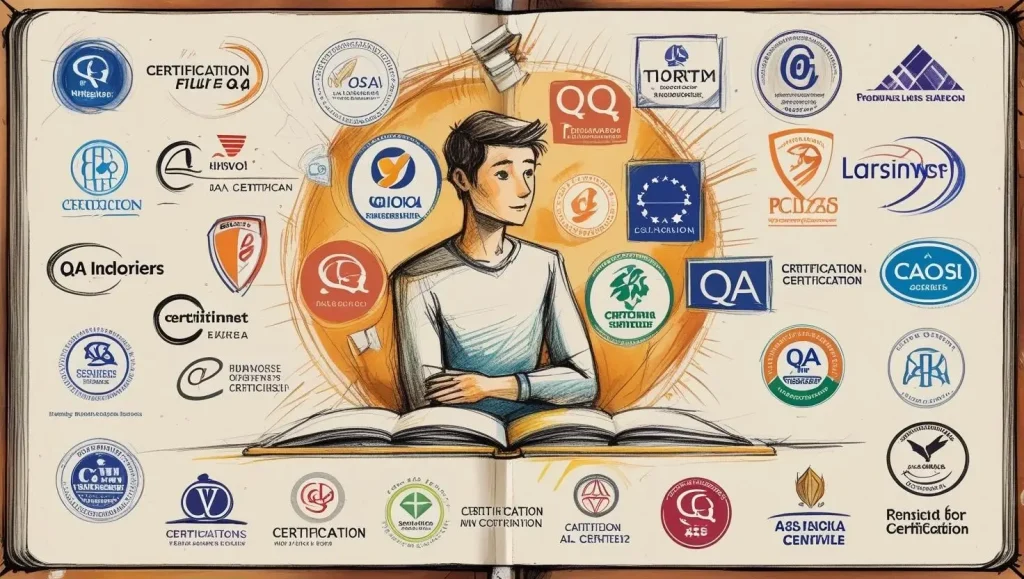
Picking the right QA certification really comes down to your career goals, current skill set, and where you see yourself in the world of software testing. For example:
- Define your focus: Choose between manual testing, automation, cloud quality assurance, or management.
- Budget considerations: Consider the cost, from free courses like BrowserStack to paid certifications.
- Learning style: Decide between self-paced online training or instructor-led live classes.
- Job market demand: Look for certifications recognized by employers in your region or industry.
- Related skills: Consider courses in Python, Java, or cloud technologies to enhance your QA profile.
- Accreditation: Make sure the provider is recognized by industry employers.
- Support: Check if the course includes job placement help, mentorship, or community access.
Maintaining and Renewing QA Certifications
Not all QA certifications are created equal when it comes to validity. Certifications like ISTQB are lifetime credentials, meaning once you earn them, you’re set. Others, such as CAST or CSTE, require renewal every 2 to 3 years—usually through continuing education or by retaking the exam.
Keeping your skills current is essential in QA because testing tools and industry methods are constantly evolving. Subscribe to QA newsletters, join forums like the Ministry of Testing or Reddit’s r/QualityAssurance, attend webinars, and keep upgrading your skills.
Career Paths for Professionals with QA Certification
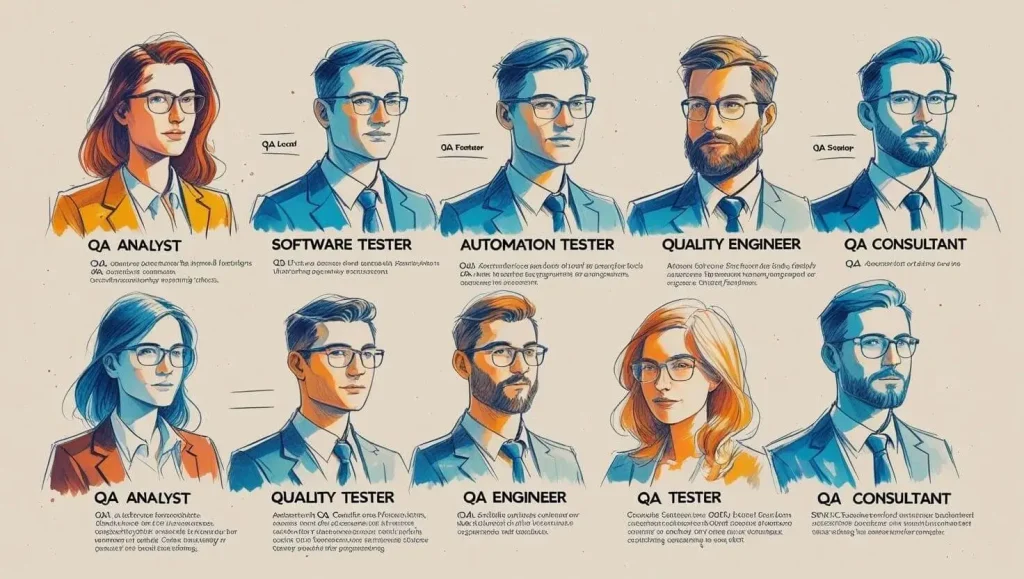
Certified QA professionals can take on many roles. These include:
- QA Analyst
- Software Tester
- Automation Tester
- Quality Engineer (QE) vs Quality Assurance (QA): These roles are different. QE focuses on engineering and improving processes. QA handles testing and quality checks.
- QA Lead or Manager
- QA Consultant
- A Software Development Engineer in Test (SDET) is a specialized professional who combines strong programming abilities with in-depth software testing expertise. It’s very sought after in QA automation.
Beside these, Quality assurance professionals are needed across a wide range of industries. Some common sectors offering QA certifications include:
- Software development
- Hospitality and tourism
- Customer service
- Agriculture and livestock
- Health care
- Information technology
- Medical devices
- Food safety
- Automotive
- Manufacturing
Quality Engineering (QE) and Quality Assurance (QA) have different goals. QE aims to build quality into processes. QA ensures software meets requirements through testing.
Certified individuals often earn more and have better job security. QA testers can make $20–45 per hour in freelance or remote jobs.
The U.S. According to the Bureau of Labor Statistics, QA jobs are expected to grow by an impressive 25% between 2023 and 2033—significantly faster than the average for other careers. This highlights the increasing demand for skilled QA professionals in today’s tech landscape.
Upcoming course of Transfotech Academy
Transfotech Academy is thrilled to introduce its brand new AI-Powered QA (Quality Assurance) Course, which will transform your perceptions regarding software testing. This comprehensive training course combines practical training with real-time application, underscoring how AI can be used to automate test creation, improve accuracy, and boost efficiency. From automated test automation to predictive analytics and error detection using AI, the course walks you through all the tools that you will need to thrive in the future-proof QA space. Whether you are just starting out in the line of work or are an experienced professional, this course is kept at industry standard and will open up innovative career opportunities. Join us to be the pioneers of the industry in quality assurance!
Frequently Asked Questions (FAQ)
Q1: Are QA engineers in demand in 2025?
Yes, the need for QA professionals is growing. This is due to software complexity and agile development.
Q2: Can I take quality assurance certification online?
Absolutely. Many organizations offer online courses and training. These are flexible and recognized worldwide.
Q3: Is QA a good career path?
Yes. It offers good pay, remote work, and career growth.
Q4: What is the average salary for a quality assurance engineer at Amazon?
Salaries range from $80,000 to $110,000 annually.
Q5: Is Transfotech Academy’s QA course beginner-friendly?
Yes. It’s designed for beginners. It offers mentorship, projects, and job help.
Q6: Do I need coding skills to start in QA?
Not necessarily. Manual testing doesn’t need programming. But, knowing basic scripting can help in automation.
Q7: How long does it take to become a QA engineer?
With focused learning, you can be ready in 16–18 weeks. Courses like Transfotech Academy help.
Final Thoughts
Starting your QA career in 2025 is a smart choice. The industry is booming, offering many opportunities. Getting a QA certification or taking online training can help you succeed.
Focus on gaining real skills and staying updated with trends. Use your certification to find rewarding jobs. Consider taking courses in cybersecurity or basic computer skills.
Ready to start your QA career? Visit TransfotechAcademy.com today to learn more and enroll in the next batch!


